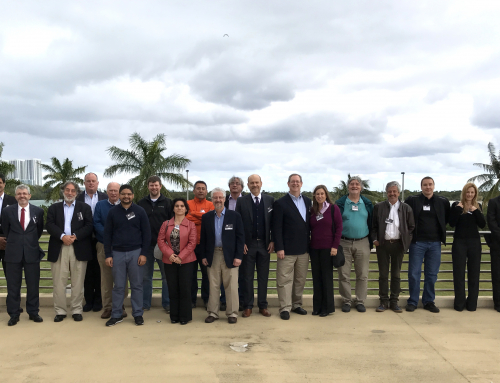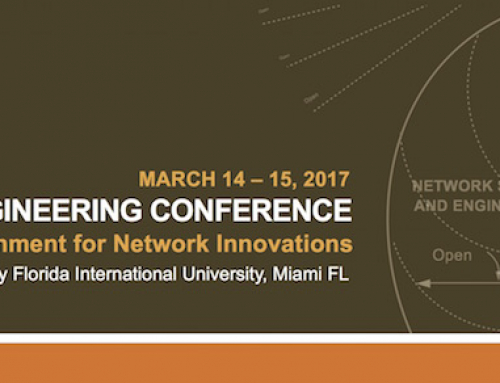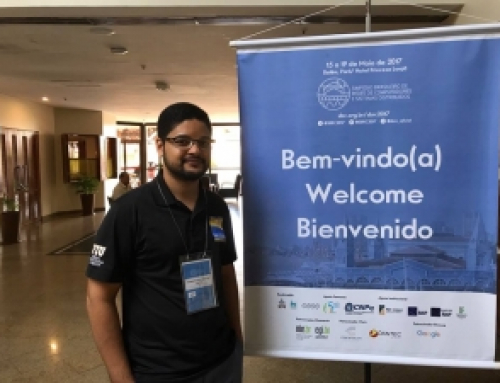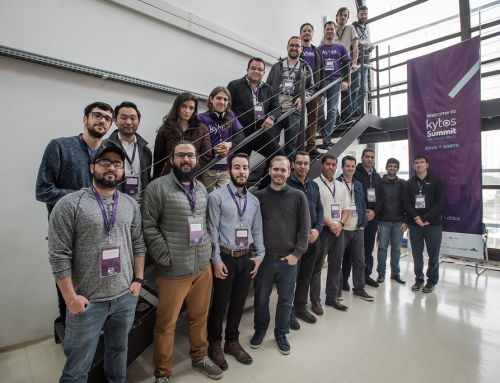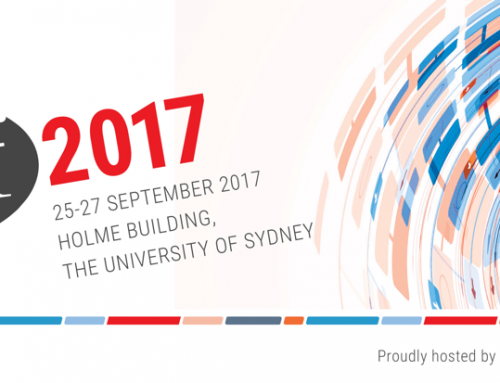Miami, FL December 19, 2017
The SuperComputing17 (SC17) event was hosted in Denver, Colorado from November 14, 2017, to November 16, 2017. Over this period, network engineers from AmLight, Academic Network of São Paulo (ANSP), State University of São Paulo (UNESP) and the California Institute of Technology (Caltech) leveraged the AmLight-ExP [1] network infrastructure to transport large data-sets on 100Gbps links between São Paulo, Miami, and Denver. Currently, AmLight-ExP has a total aggregated capacity of 240Gbps between South America and North America. In addition, two 100G circuits were installed between Miami and Denver provisioned by CenturyLink.
To generate network traffic for the demonstrations at SC17, several DTNs (data transfer nodes) running either nuttcp [2] or FDT [3] were leveraged in São Paulo (UNESP/ANSP), Miami (AMPATH) and Denver (Caltech and UNESP booths). Also, the Kytos SDN Platform [4]was utilized to provision Layer 2 paths between these DTNs for the data transfers using dedicated OpenFlow switches and AmLight SDN’s slicing capabilities. On November 16th, in the afternoon, several demonstrations were encouraged to generate as much network traffic as possible to fill-up SC17 links. At AmLight, a steady 370 Gbps total aggregated traffic was transported, which is illustrated in Figure 1.
Figure 1 – Total aggregated switches network traffic on AmLight network at SC17 November 16, 2017
“The conference was a great opportunity to showcase Kytos, an open-source SDN platform that has been developed by SPRACE with the support of Huawei. Our next step will be to deploy Kytos on the ESnet testbed in association with the AmLight engineers”, said Sergio Novaes, PI of SPRACE and scientific director of UNESP Center for Scientific Computing.
“We consider these achievements very important, and we are satisfied in participating in these successful demonstrations at SC17. Exercising and stressing intensive data transfers on multiple 100 Gbps WAN links between the United States and South America, especially, between Sao Paulo, Miami and Denver, give us confidence to support a service of intensive data transfers for our academic community, regionally or on globally distributed science programs”, said Eduardo Grizendi, Director of Engineering and Operation of RNP, the Brazilian Academic Network.
About AmLight ExP: AmLight Express and Protect (ExP) implements a hybrid network strategy that combines optical spectrum (Express) and leased capacity (Protect) that builds a reliable, leading-edge diverse network infrastructure for research and education. AmLight ExP operates high-performance network links connecting Latin America to the U.S., funded by the National Science Foundation (NSF award #ACI-1451018); With significant investments from the Academic Network of São Paulo (ANSP), and Rede Nacional de Ensino e Pesquisa (RNP) and the Association of Universities for Research in Astronomy (AURA), the total bandwidth provided by AmLight ExP between the U.S. and South America is expected to grow to more than 680 Gibabits per second in aggregate capacity between 2015 and 2020. (http://www.amlight.net/)
About ANSP: The Academic Network of São Paulo (ANSP) provides connectivity to the top R&E institutions, facilities and researchers in the State of São Paulo, Brazil, including the University of São Paulo, the largest research university in South America. ANSP directly connects to AmLight-ExP in Miami. ANSP also provides connectivity to UNESP, housing one of the largest computational clusters in Latin America, supporting interdisciplinary grid-based science. (www.ansp.br)
About Caltech: The mission of the California Institute of Technology (Caltech) is to expand human knowledge and benefit society through research integrated with education. We investigate the most challenging, fundamental problems in science and technology in a singularly collegial, interdisciplinary atmosphere, while educating outstanding students to become creative members of society. The contributions of Caltech’s faculty and alumni have earned national and international recognition, including 38 Nobel Prizes. (http://www.caltech.edu/)
About CIARA: Florida International University’s Center for Internet Augmented Research and Assessment (CIARA), in the Division of IT, has developed an international, high-performance research connection point in Miami, Florida, called AMPATH (AMericasPATH; http://www.ampath.net/). AMPATH extends participation to underrepresented groups in Latin America and the Caribbean, in science and engineering research and education through the use of high-performance network connections and hosts the international exchange point in Miami where AmLight-ExP connects to the US. (www.ciara.fiu.edu)
About Florida LambdaRail: Florida LambdaRail (FLR) is Florida’s Research and Education Network. With its 100 Gbps 1,540 miles dark fiber network, FLR provides a cost effective, ultra-high speed, inter-connected, broadband service delivery network that enables Florida’s higher education institutions and partners to collaborate, connect, utilize and develop new innovative broadband applications and services in support of their scientific research, education, and 21st century economy initiatives. (www.flrnet.org)
About RNP: RNP is the Brazilian National Education and Resource Network. It provides national connectivity and value-added services for Universities, Technology and Research Institutions in Brazil, operating a national robust multi-gigabit backbone and connecting their institutions, in partnership with local and regional ISPs. For international connections, RNP collaborates with AmLight Project, joint ANSP, FIU and other partners. (www.rnp.br)
About SC17: The SC Conference is dedicated to showcasing work in high performance computing, networking, storage and analysis by the international HPC community. The SC Technical Program is highly competitive and one of the broadest of any HPC conference. Traditionally, the program includes invited talks, panels, research papers, tutorials, workshops, posters, and Birds of a Feather (BoF) sessions. The SC17 Exhibits is the largest in the history of the conference and is being led by organizations that have the tools and research powering green energy, artificial intelligence, machine learning, aerospace, advanced manufacturing and other industries that rely on high performance computing.
(www.sc17.supercomputing.org)
About SPRACE: The São Paulo Research and Analysis Center (SPRACE) is implemented with financial support from FAPESP, to provide the necessary means for the participation of high energy physics researchers from the State of São Paulo in these experiments. SPRACE congregates members of the DZero Collaboration at Fermilab and of the Compact Muon Solenoid (CMS) Collaboration at CERN. The SPRACE computing center provides more than ten Teraflops of computing power and it has been contributing for the processing, storage and analysis of the data produced by these experiments. (http://www.sprace.org.br/)
About UNESP: Universidade Estadual Paulista (UNESP) is one of the largest and most important Brazilian universities, with distinguished achievements in teaching, research and extension services. UNESP has consolidated a project joining scientific, technological, economic, cultural and social development committed to democratic principles and clearly conscious of its status of a governmental institution, inserted and highly active in Brazilian society. UNESP´s actions are focused in nearly every field of experimental and theoretical sciences such as: engineering, health, communications, humanities, social sciences and arts, among others. (http://www.unesp.br/)
[1] AmLight-ExP: Americas Lightpaths Express and Protect. Available at: https://www.amlight.net. Accessed on November 21, 2017.
[2] nuttcp: network performance measurement tool. Available at: https://www.nuttcp.net. Accessed on November 21, 2017.
[3] Fast Data Transfer – FDT is an open source application written in Java based on an asynchronous, flexible multithreaded system for efficient data transfers, which is capable of reading and writing at disk speed over wide area networks with standard TCP. It is available at https://fast-data-transfer.github.io/ . Accessed on December 18, 2017.
[4] Kytos SDN Platform. Available at: https://kytos.io/. Accessed on November 21, 2017.


